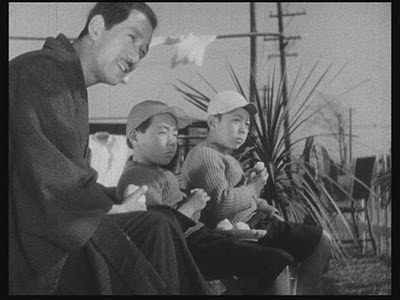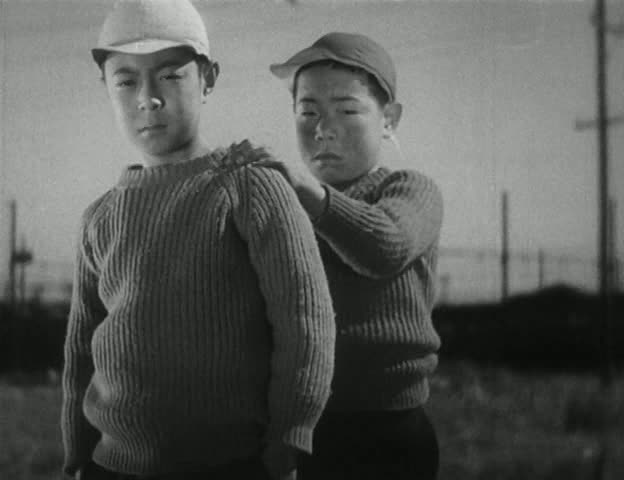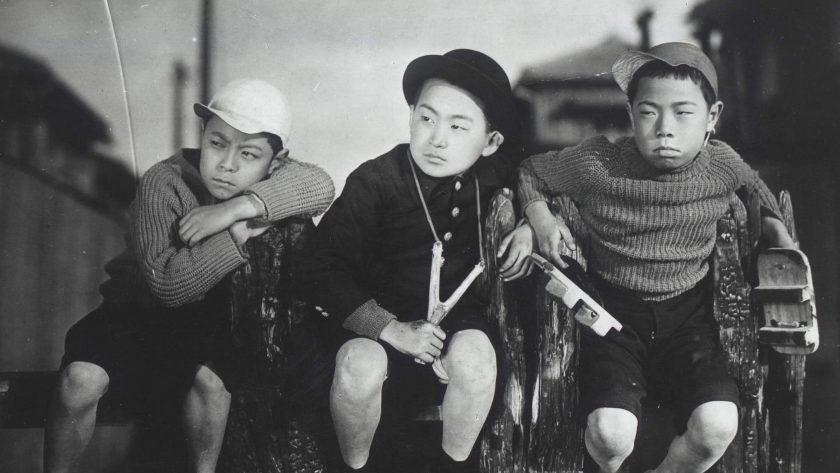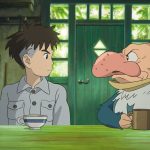Ivan Noden reviews Yasujirō Ozus’s 1932 Japanese silent film about the struggles of two brothers understanding grown-ups and integrating within a social circle.
The first shot of Yasujirô Ozu’s I Was Born, But.. (1932) is a seemingly innocuous image of a car wheel trapped in mud, spinning and desperately trying to move forward, but ultimately, stuck in place. With this, Ozu masterfully lays out the themes and purpose of the film to come. While the mastery continues throughout, its few but deep flaws prevent the film from reaching its full potential.
In 1930s Japan, fascism was on the rise as the far-right had a strong grip over the government. As you may expect, this was coupled with the violent suppression of the left and resulted in tight control over media. The types of films that bypassed this censorship were melodramas, and so came the popularity of the ‘shōshimin-eiga’: films about the real lives of the lower-middle class (i.e. the movie-going audience).
For the first two-thirds of the run-time, we are treated to the pinnacle of this genre, closely exploring the day-to-day suburban life as we follow the story of two boys, Ryoichi (Hideo Sugawara) and Keiji (Tomio Aoki), in their attempts to settle into a new town and overcome the bullies that torment them. The quaint scope leads to a narrative that exudes charm and realism, feeling more like an anecdote or memory than a movie production. Stylistically, Ozu achieves this by stamping his signature within every shot: the cameras are low to the ground and the characters are often living their lives in the background; objects are sometimes obscured in the foreground and even occasionally out of focus, as though the camera was accidentally left there to capture reality. The reality presented is one filled with details that feel dismissable on the surface, yet add great texture to the world. The recurrence of the sparrow eggs; the dog falling ill; and the toy puzzle are all specific elements that give the story a unique identity, yet manage to universalise the experience of the boys as we relate to them with our own similar memories of childhood.

These details are loaded with meanings that reveal themselves when the film’s thesis is made clear during the wonderfully crafted ‘home movie’ scene. This particular scene stands out visually: quicker cuts; overwhelming darkness; and harsher lighting make the emotional violence all the more visceral as the boys realise that their father, Yoshi (Tatsuo Saito), is not the great man they think he is. Instead, he is living in mediocrity, dependent on the debasing worship of his boss in order to support his family. The thread that this and the ensuing scenes pull-on is laid out expertly beforehand for the first hour. What was initially a story about bullying, now becomes a clear reflection of the power structures within class society, elevating the film from melodrama to social dissection.
Looking back on the film added another level of enjoyment, as every small moment felt like it could have been a hidden metaphor or an analogue for the film’s wider themes. Take, for instance, the game played by the bully where the bully’s fighting pose makes one of the other boys play dead. This scene mirrors a later one, involving our two protagonists as they finally overcome the bully and take his place in the gang. I don’t think it’s a stretch to say that this is symbolic of moving up castes within the class hierarchy, making life better for the individual while maintaining the broad strokes of the power structures that caused their initial suffering. There are so many instances like this throughout, yet, it never becomes too overbearing. Every detail is there for more than just commentary: they add colour to the world and never feel like they’re being forced down our throats.

It is clear though that the commentary present is very limited. It would be fair to assume that this was due to the contextual restrictions Ozu faced and the threat of censorship, however, it is still a gaping hole at the core of the movie’s ideas. The only real political analysis comes from Yoshi who teaches his children that wealth and greatness are not one and the same – something many of us may take as given. The questions regarding why these class systems are in place, why they create an unfair life for those not at the top of society, and what we can do about it are never asked. Ozu does well in scratching the surface but doesn’t go deep enough to find anything particularly interesting. I’m not sure many viewers would gain much from this commentary when we are spoiled for choice with films that have such rich analyses of Marxism and class. Consequently, we do not feel the blunt emotional punch that we may get from other films exploring the despairs of class differences, instead, we share the melancholic state that Yoshi finds himself in. However, this very much fits into the scale of the film and, arguably, allows a wider audience to relate their own misfortunes and feelings of their ennui in life onto those presented on screen.
Aside from the messaging of the film, so much is executed with great skill. The visual comedy throughout is reminiscent of the best of Chaplin and Keaton, though without their intense physicality which prevents the film from becoming farcical, and the physical performances of the actors are superb. This is most evident in Sugawara and Aoki, the two lead actors who are able to convey so much with just the looks they give each other, adding weight to a relationship that helps drive the film forward and provide a strong backbone for everything else to latch onto.
There’s definitely nothing subpar about how this film achieves what it sets out to, it is what it is and actually achieves what it set out to do, but that’s what stops it from being great.
Watch I Was Born, But… here:




